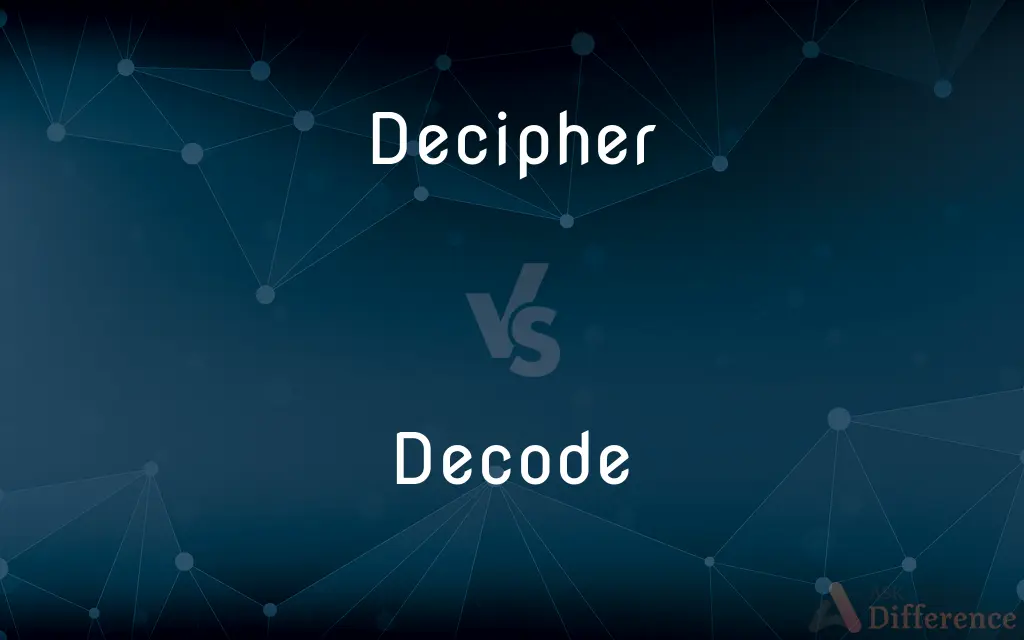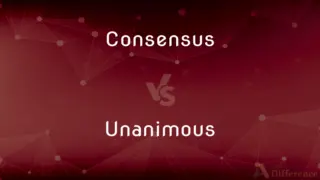Decipher vs. Decode — What's the Difference?
Edited by Tayyaba Rehman — By Maham Liaqat — Updated on April 24, 2024
Decipher involves interpreting obscure or illegible text, while decode focuses on converting coded messages into understandable language.

Difference Between Decipher and Decode
Table of Contents
ADVERTISEMENT
Key Differences
Deciphering often deals with understanding difficult handwriting or ancient scripts, whereas decoding involves translating a coded language or secret messages into a form that can be easily understood.
Decipher may require historical and linguistic knowledge to interpret older texts, while decoding generally relies on knowledge of specific codes or ciphers.
The goal of deciphering is to make unclear texts legible and understandable; on the other hand, decoding aims to reveal the hidden meaning in encoded messages.
Techniques for deciphering include contextual guessing and comparing with known languages, whereas decoding often uses mathematical algorithms and predefined keys.
Decipher can apply to non-coded texts that are simply hard to read due to damage or obsolescence, while decode specifically targets texts intentionally obscured through cryptographic methods.
ADVERTISEMENT
Comparison Chart
Definition
Interpreting unclear or illegible text
Translating coded messages to clear text
Required Knowledge
Historical, linguistic knowledge
Knowledge of codes, ciphers
Goal
Make texts legible and understandable
Reveal hidden meanings
Typical Uses
Ancient manuscripts, faded letters
Encrypted communications, data security
Methods
Contextual analysis, comparative linguistics
Algorithms, cipher keys
Compare with Definitions
Decipher
To make sense of difficult handwriting.
The historian had to decipher the faded diary entries from the 18th century.
Decode
To convert code into plain text or a comprehensible form.
The spy had to quickly decode the encrypted message.
Decipher
To interpret or make out unclear words or phrases.
He managed to decipher her mumbled words in the noisy room.
Decode
To unravel or make understandable a difficult concept.
The teacher decoded the scientific concept for the young students.
Decipher
To solve or understand something complex or puzzling.
She deciphered the complex mathematical problem.
Decode
To translate data or signals into a form that can be processed.
The computer decodes the input from the user into actions.
Decipher
To convert text from an obscure or ambiguous form into readable text.
Archaeologists often decipher ancient inscriptions to learn about past civilizations.
Decode
To understand or make clear something complex.
Software developers decode complex algorithms every day.
Decipher
To discover the underlying meaning of something cryptic.
The critic deciphered the symbolism in the novel.
Decode
To interpret a hidden or symbolic meaning.
The psychologist helped decode the patient's dreams.
Decipher
To read or interpret (ambiguous, obscure, or illegible matter).
Decode
To convert from code into plaintext.
Decipher
To convert from a code or cipher to plaintext; decode.
Decode
To convert from a scrambled electronic signal into an interpretable one.
Decipher
(transitive) To decode or decrypt a code or cipher to plain text.
Decode
To extract the underlying meaning from
Decode a complex literary text.
Decipher
(transitive) To read text that is almost illegible or obscure
Decode
To convert from an encrypted form to plain text.
The cryptographer decoded the secret message and sent the result to the officer.
Decipher
(transitive) To make sense of a complex situation.
Decode
To figure out something difficult to interpret.
I finally managed to decode the nearly illegible doctor's prescription.
Decipher
(transitive) To find a solution to a problem.
Decode
(cryptography) A product of decoding
Decipher
A decipherment; a decoding.
Decode
(computing) Output from a program or device used to interpret communication protocols
Decipher
To translate from secret characters or ciphers into intelligible terms; as, to decipher a letter written in secret characters.
Decode
To convert from a coded form into the original form; - of communications. Inverse of encode.
Decipher
To find out, so as to be able to make known the meaning of; to make out or read, as words badly written or partly obliterated; to detect; to reveal; to unfold.
Decode
Convert code into ordinary language
Decipher
To stamp; to detect; to discover.
You are both deciphered, . . . For villains.
Decipher
Convert code into ordinary language
Decipher
Read with difficulty;
Can you decipher this letter?
The archeologist traced the hieroglyphs
Common Curiosities
What is a common tool used in decoding?
Cipher keys and decoding software are common tools used in decoding.
Can deciphering apply to any text?
Yes, deciphering can apply to any text that is hard to read, not necessarily coded.
What skills are essential for decoding?
Skills in mathematics and an understanding of encryption methods are crucial for decoding.
What types of texts are typically deciphered?
Ancient manuscripts, historical documents, and faded letters are typical texts that require deciphering.
Why is decoding important in modern times?
Decoding is crucial for data security and communication privacy in our digital age.
Is historical knowledge necessary for decoding?
Historical knowledge is not typically necessary for decoding, which often relies more on technical skills.
What is the main focus of deciphering?
Deciphering focuses on rendering obscure, ambiguous, or illegible text into readable and understandable language.
Do modern tools aid in deciphering?
Modern tools such as imaging technology and digital databases aid significantly in deciphering obscure texts.
Can deciphering help in understanding languages?
Yes, deciphering can help linguists and historians understand extinct or ancient languages.
How does decoding differ from deciphering in terms of purpose?
Decoding specifically targets encrypted or coded messages to reveal hidden content, unlike deciphering which makes any unclear text readable.
What is a simple example of a decoding task?
A simple example of a decoding task is translating Morse code into English.
What is the first step in deciphering a text?
The first step in deciphering a text is often understanding the context in which it was written and identifying any known linguistic patterns.
Can decoding be done manually?
Yes, decoding can be done manually, especially if the code is simple or the key is known.
How are deciphering and decoding similar?
Both processes involve transforming text to make it more comprehensible, though they apply to different types of text.
Can anyone learn to decode?
With the right tools and education, anyone can learn basic decoding techniques.
Share Your Discovery

Previous Comparison
Consensus vs. Unanimous
Next Comparison
Mold vs. ShapeAuthor Spotlight
Written by
Maham LiaqatEdited by
Tayyaba RehmanTayyaba Rehman is a distinguished writer, currently serving as a primary contributor to askdifference.com. As a researcher in semantics and etymology, Tayyaba's passion for the complexity of languages and their distinctions has found a perfect home on the platform. Tayyaba delves into the intricacies of language, distinguishing between commonly confused words and phrases, thereby providing clarity for readers worldwide.
















































